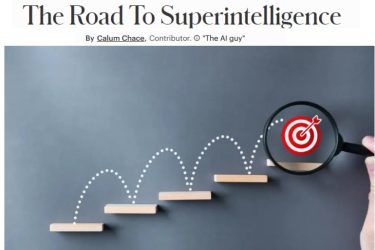
-
Machines will equal or surpass human performance in more cognitive and motor skills. For instance, speech recognition in noisy environments, and aspects of NLP – Natural Language Processing. Google subsidiary DeepMind will be involved in several of the breakthroughs.
-
Unsupervised learning in neural networks will be the source of some of the most impressive results.
-
In silico models of the brains of some very small animals will be demonstrated. Some prominent AI researchers will predict the arrival of strong AI – Artificial General Intelligence, or AGI – in just a few decades.

-
Speech will become an increasingly common way for humans to interact with computers. Amazon’s early lead with Alexa will be fiercely challenged by Google, Microsoft, Facebook and Apple.
-
Some impressive case studies of AI systems saving significant costs and raising revenues will cause CEOs to “get” AI, and start demanding that their businesses use it. Companies will start to appoint CAIOs – Chief AI Officers.
-
Self-driving vehicles (Autos) will continue to demonstrate that they are ready for prime time. They will operate successfully in a wide range of weather conditions. Countries will start to jockey for the privilege of being the first jurisdiction to permit fully autonomous vehicles throughout their territory. There will be some accidents, and controversy over their causes.
-
Some multi-national organisations will replace their translators with AIs.

-
Some economists will cling to the Reverse Luddite Fallacy, continuing to deny that cognitive automation could cause lasting unemployment because that is not what has happened in the past. Others will demand that governments implement drastic changes in the education system so that people can be re-trained when they lose their jobs. But more and more people will come to accept that many if not most people are going to be unemployed and unemployable within a generation or so, and that we may have to de-couple incomes from jobs.
-
As a result, the debate about Universal Basic Income – UBI – will become more realistic, as people realise that subsistence incomes will not suffice. Think tanks will be established to study the problem and suggest solutions.
-
AI systems will greatly reduce the incidence of fake news.

-
There will be further security scares about the Internet of Things, and some proposed consumer applications will be scaled back. But careful attention to security issues will enable successful IoT implementations in high-value infrastructural contexts like railways and large chemical processing plants. The term “fourth industrial revolution” will continue to be applied – unhelpfully – to the IoT.
-
2016 was supposed to be the year when VR finally came of age. It wasn’t, partly because the killer app is games, and hardcore gamers like to spend hours on a session, and the best VR gear is too heavy for that. Going out on a limb, that problem won’t be solved in 2017.


